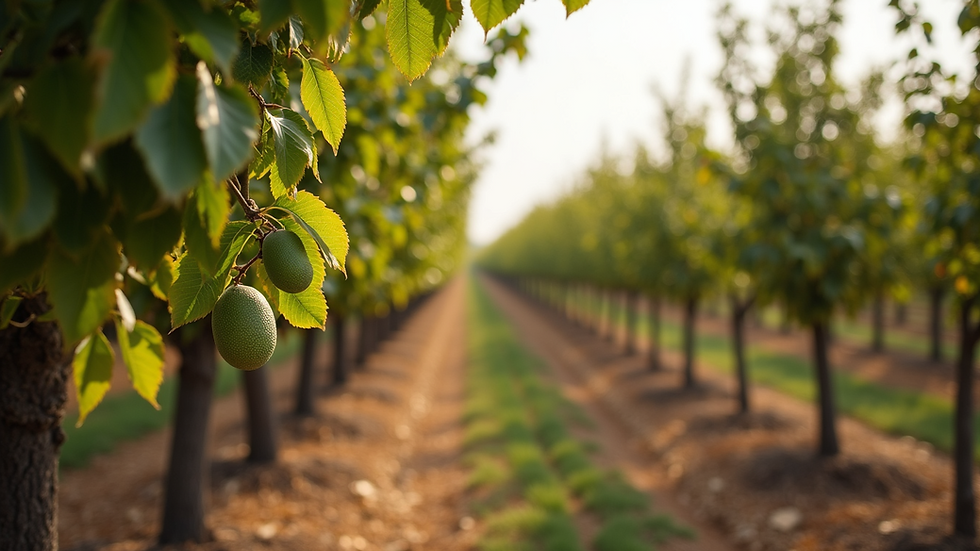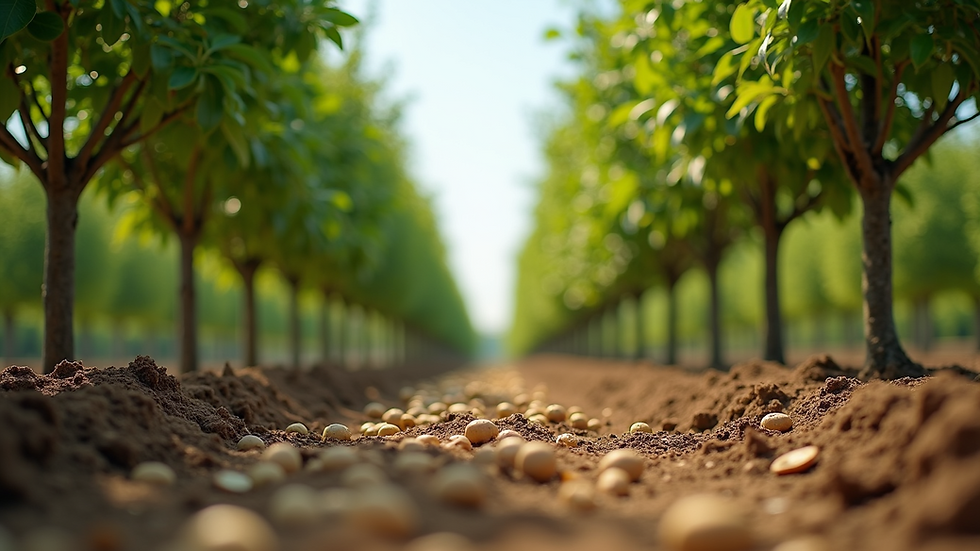Importing High-Yield Walnut and Cashew Seedlings to Boost Domestic Production
- jstamitkareer
- May 24, 2025
- 3 min read
The Nuts and Dry Fruits Council is making a bold move by importing high-yield walnut and cashew seedlings. This initiative aims to elevate domestic production, positively impacting both farmers and consumers. By introducing these seedlings, the council demonstrates a commitment to sustainable agriculture and innovation within the nut industry.
This article explains the reasons for this decision, outlines the benefits to domestic agriculture, and discusses potential challenges in the process.
The Importance of High-Yielding Seedlings
High-yielding seedlings are vital for increasing agricultural productivity. Traditional walnut and cashew varieties can produce only 300 to 500 nuts per tree, while modern high-yield varieties can yield from 800 to 1,200 nuts. This increase can significantly boost a farmer's income and stabilize market supply.
These new seedlings are developed through research that prioritizes productivity. Farmers can achieve greater profits through enhanced yields, making it easier to meet rising consumer demand for nuts. In fact, the global nut market is anticipated to grow by 4.5% annually, further illustrating the urgency for domestic producers to keep pace.
Agricultural Sustainability
Sustainability is a crucial aspect of modern agriculture. The initiative to import high-yielding seedlings is in line with sustainable farming trends worldwide. These seedlings often feature enhanced resistance to pests and diseases, which helps to reduce reliance on chemical pesticides and fertilizers by as much as 30%.
By adopting environmentally friendly practices, farmers can operate with fewer resources, aligning with consumer expectations for sustainability. Techniques that improve soil health, conserve water, and lower carbon emissions further contribute to mitigating climate change.
Economic Benefits for Farmers
The import of high-yielding seedlings from the Nuts and Dry Fruits Council may create significant economic benefits for local farmers. Although the initial investment can be higher—estimates suggest costs can rise by around 20%—the long-term benefits, including increased yields, can lead to profit boosts of approximately 50% over the first few years.
For instance, a farmer may shift from producing 1,000 kg of nuts to 1,500 kg with the new seedlings. As nut consumption increases, local producers can gain a substantial share of both domestic and international markets. Moreover, increased nut production can create job opportunities across the supply chain, from planting to processing, further enhancing rural economies.
Addressing Challenges
Despite the numerous benefits, there are challenges with integrating high-yielding seedlings into current farming practices. Farmers may need training and education to adapt to new cultivation methods. Estimated costs for training programs may reach $5,000 per region but can yield lasting benefits.
Additionally, it's crucial to ensure that these seedlings acclimate to local conditions. Climate, soil type, and existing farming techniques can all impact seedling success. Conducting rigorous research before large-scale implementation is essential for effective rollout. Continuous support from agricultural extension services will also be vital to monitor seedling performance and support farmers in overcoming challenges.
Enhancing Domestic Nut Production
The decision to import high-yield walnut and cashew seedlings is a transformative step toward improving domestic nut production. By increasing output, the Nuts and Dry Fruits Council will help ensure consumers have access to high-quality nuts and support the livelihoods of local farmers.
This initiative may lead to broader agricultural reforms focusing on sustainability and innovation. As more farmers embrace high-yielding varieties, the resulting competitive pricing and better quality products can foster a robust nut industry.

Looking Ahead for the Nuts Industry
The importation of high-yield walnut and cashew seedlings signals a significant opportunity to revitalize domestic nut production. By focusing on sustainability and economic rewards for local farmers, this initiative could bring about positive changes for the agricultural sector.
Challenges must be addressed with comprehensive education and support for farmers. If managed correctly, this initiative may transform the nuts industry, ensuring its growth in a competitive market while promoting sustainable practices.
As this program develops, it will be exciting to see the positive effects on the agricultural landscape and the economy, paving the way for a brighter future in nut production.

.png)









Comments